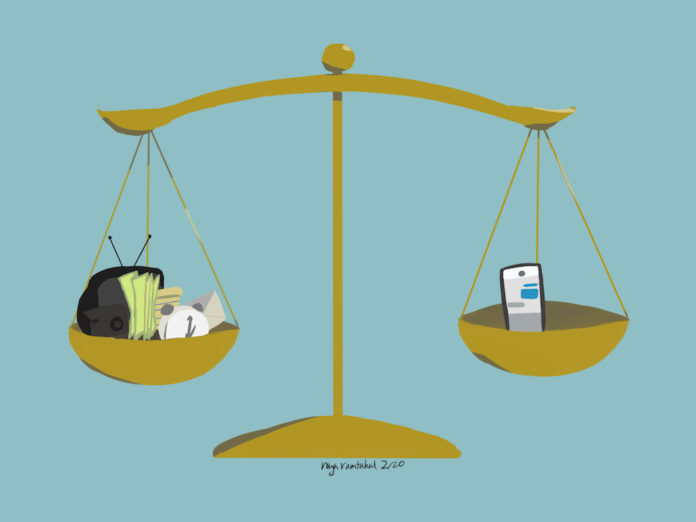On my way back to Occidental after winter break, I boarded a flight from Portland to San Jose, and after a brief layover, another from San Jose to Burbank. After texting my mom that I had boarded on time, I set my phone on airplane mode, tucked it into the seatback pocket and settled in with a book.
One hour later, I shouldered my backpack, marched off the plane and made my way to baggage claim. I ran into a girl from my dorm who offered me a ride back to campus in her friend’s car, sparing me a Lyft. I spent most of the ride looking out the window, refamiliarizing myself with California: the big brown hills, the one-story buildings, the sun-bleached storefronts and concrete roads. We were halfway back to Occidental before I realized I had left my phone on the plane.
The two weeks that followed were some of the most inconvenient of my adult life; they forced me to reckon with the number of items my phone has now replaced. By the time I fetched my new phone from the mailroom, I had reassessed how I use my phone. Per popular opinion, I always assumed that when I spent too much time on my phone, it was because I was addicted to the unique evils of the digital age: social media, excessive texting and near-constant access to the internet. There are, however, another set of reasons I reach for my phone that encourage and increase my daily screen time.
My Macbook computer solved one of the most glaring problems with my phonelessness: communication. I had access to iMessage and Instagram so long as my computer was charged and connected to Wi-Fi. This inflexibility severely limited my ability to use these services to quell boredom — I didn’t want to open my laptop on the bus, while walking or in the middle of a conversation. I sent fewer casual texts. I mainly used messaging to figure out where people were, or when I should meet them. Because I thought texting and social media were the primary reasons I used my phone, I approached my two weeks sort-of-off-the-grid without a lot of apprehension.
Then problems started to appear. For one, I didn’t have a watch. I never knew when I had to meet people, when my next class started or when I needed to wake up. This was so problematic I ended up borrowing a watch from a friend. An alarm clock, however, was nearly impossible to track down. One of my friends had a decorative one that she had to set for me every night because I couldn’t figure out how it worked.
Most surprising was realizing how little I know about navigating the area I live in. It was challenging to know which direction would take me to Eagle Rock Boulevard, or how to find Colorado Boulevard, despite frequenting these streets on a weekly basis. I didn’t know the general cardinal directions buses would take me — even buses like the 180, which I ride all the time. I’ve always known I was bad with directions, but I began questioning whether this was an inherent ineptitude or a result of never really needing to know where I was or where I was going.
It was embarrassing to reconcile with how unaware I was of my surroundings. When I had a portable GPS, planner and encyclopedia on me at all times, my self-reliance disappeared right under my nose. Without my phone, I was uncomfortable going anywhere off campus alone. I like to think of myself as independent, but a lot of that is conditional. I need my phone to replace the basic skills, like navigation, that I would’ve developed if I’d grown up before the digital age. It seemed the most important tool my phone replaced was my memory. In my hometown, Portland, I can get just about anywhere if I walk long enough, having wandered the city for years without Google Maps. If I hadn’t lost my cell phone, I wonder if I would ever have gained any semblance of that familiarity with Eagle Rock, let alone Los Angeles.
I’m not arguing that social media and texting aren’t important parts of the digital use debate. Most of the time when I’m mindlessly scrolling through Instagram, it’s because I pulled out my phone to check the time, set an alarm or look up what room my next class is in. There are a lot of instances, like navigation, where I use my cell phone when I don’t need to — it’s just more convenient. My phone felt like an extension of myself that would always be there for me. Now, I see my cell phone as a tool — a helpful tool, but nothing more.
If I really want to be independent and aware, I need to reassess the dependence I have on my phone. Now that I have it back, I’m going to make a better effort to understand how I’m using it. If I lose my phone, I don’t want to lose my independence along with it.
Jane Walker is an undeclared first year. She can be reached at lwalker@oxy.edu.
![]()































